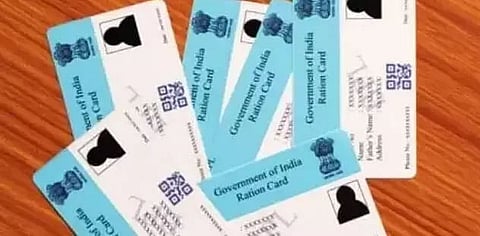
- Home
- Live Blog
- Breaking News
- Top Headlines
- Cities
- NE News
- Sentinel Media
- Sports
- Education
- Jobs

The July 31 deadline set by the Supreme Court for all states and Union Territories to implement the One Nation One Ration Card (ONORC) scheme appears to have hit the Aadhaar roadblock in Assam. Low Aadhaar seeding of the ration card in the state has delayed implementation of the scheme. Aadhaar seeding is one of the technical requirements to ensure the portability of ration cards under ONORC. Official data reveal that of the total 58.93 lakh ration cards in the state only 13.56 lakh cards have so far been Aadhaar seeded. When interpreted this data in terms of beneficiaries of the total 2.51 crore beneficiaries only 19.76 lakh have been covered by Aadhaar seeded ration cards. As far as linking the ration cards with mobile numbers, the bank account of holders, the progress is significant and has surpassed the 50-lakh mark. National lockdown during the first wave of COVID-19 last year uncovered an invisible India. Lakhs of migrant workers across the country suffered endless miseries when they could travel back to their homes and got stranded with no access to ration under public distribution system outside their home states. The Central government explained to the apex court that ONORC would empower the migrant beneficiaries of the National Food Security Act (NFSA) to access food grains from any Fair Price Shop anywhere in the country by using their existing ration cards seeded with biometric identification. In its submission, the Central Government clarified that although the facility of ONORC shall equally benefit all 80 crore NFSA beneficiaries to lift their food grains from any FPS of choice, but it primarily aims to enable migratory NFSA beneficiaries (mostly labourers, daily-wagers, urban poor like rag-pickers, street-dwellers, temporary workers in organized and unorganized sectors, domestic workers, etc.) who frequently travel in search of better opportunities. The Department of Food and Public Distribution under the Ministry of Consumer Affairs and Public distribution took up the implementation of ONORC for the nationwide portability of NFSA ration cards in May 2019. In August 2019, the inter-State portability of ration cards was started in four states and by January 2020 altogether 12 States were seamlessly integrated under a single ONORC cluster at the national level and by December 2020 86% NFSA population in the country were brought under the ONORC plan. Electronic Point of Sale (e-POS) device is essential for rolling out this mega digitised PDS. As PDS data is available online at the Integrated Management of Public Distribution System (IMPDS), any eligible migratory beneficiary can receive his/her quota of subsidised food grains anywhere by just providing the ration card number having his/her name to any FPS dealer may lift the available entitlements after biometric/Aadhaar authentication on ePoS device. National Food Security Portal website data reveal of the total 36,606 Fair Price Shops (FPS) in Assam that state has not operational e-POS due to which migrant workers from other states will not get access to their ration under ONORC in the state. While COVID-19 pandemic disruptions slowed down the Aadhaar enrolment process in the state, locking of biometric identities following submission of claims and objection in the NRC has resulted in poor progress in the new Aadhaar enrolment. Assam government has been urging the Central Government to unlock the biometrics of around 38 lakh NRC applicants to expedite Aadhaar enrolment. Their biometrics were obtained by NRC authorities during the process of submission of claims and objections and till these biometrics are unlocked by the government they will not be able to enrol with the Unique Identification Authority of India for the Aadhaar number. As cases related to NRC is pending before the Supreme Court, unlocking of biometrics will require a directive by the apex court. Several lakhs of youth from Assam migrate to different places across the country, most of them to southern states for livelihood opportunities. During the nationwide lockdown over 4.3 lakh, migrant workers from the state were stranded which exemplifies expediting the implementation of the ONORC in the state so that they do not land similar situations without access to food and ration while migrating to other states. Without the assurance of deriving benefits under the ONORC, the migrant workers may not return to their workplaces when those reopen after the pandemic wave subsides. Prolonged second wave lading to several states resorting to partial lockdown and other containment measures, access to PDS entitlement through ONORC has become a key consideration for migrant workers to decide if they would return to their workplaces. When the country is preparing for the third wave of COVID-19 pandemic the element of uncertainty has only intensified for migrant workers. Assam expediting linking of Aadhaar biometrics is crucial for seamless portability of ration cards in the entire country. The complexities around the biometrics in the NRC process in the state have pushed the ONORC implementation in the state to uncertainty.